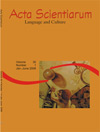<strong>A parody of autobiographies in Lygia Fagundes Telles</strong> - DOI: 10.4025/actascilangcult.v30i1.4058
Abstract
This study defends the idea that the novel As horas nuas (1989), by Lygia Fagundes Telles, presents a sophisticated auto-referential game concerning the artistic production in itself. The scenes in which Rosa, the main character, tries to write her memories, but is absorbed by alcoholism, strengths the idea of parody and esthetic disorder in this novel. Rosa narrates and comments the superficiality of her memories until the moment that she abandons her writing project, which can be read as a parody of autobiographies. This hypothesis is supported methodologically by the post-structuralism concepts proposed by Jacques Derrida, which defends the writing as a game, medicine, poison or theater, beyond other concepts. Using the esthetic supplements of Rosa’s staging, which narrates her memories to a recorder, the reader concerned about “how” the novel was built discovers new scripts of the novel that provokes self-questioning in the development of the narrative. In the end, the silence of Rosa can be interpreted as a criticism about the superficiality and the narcissism of the autobiographies.Downloads
Metrics
DECLARATION OF ORIGINALITY AND COPYRIGHTS
I Declare that current article is original and has not been submitted for publication, in part or in whole, to any other national or international journal.
The copyrights belong exclusively to the authors. Published content is licensed under Creative Commons Attribution 4.0 (CC BY 4.0) guidelines, which allows sharing (copy and distribution of the material in any medium or format) and adaptation (remix, transform, and build upon the material) for any purpose, even commercially, under the terms of attribution.
Read this link for further information on how to use CC BY 4.0 properly.




















6.png)









